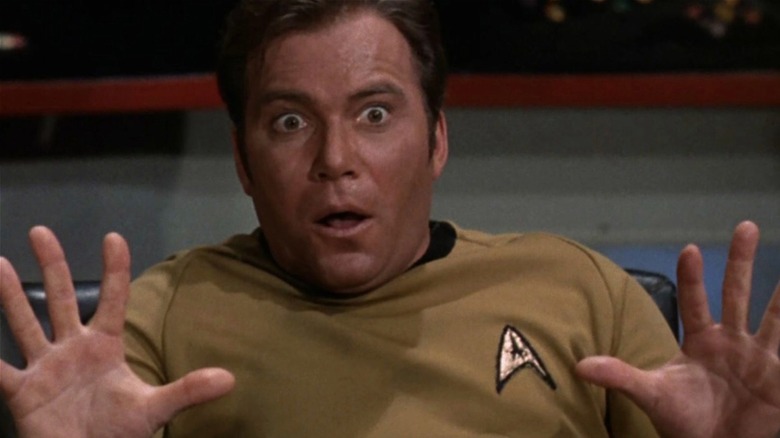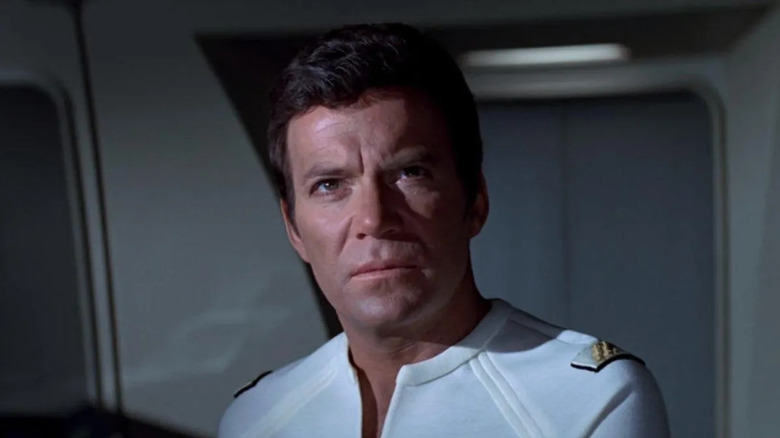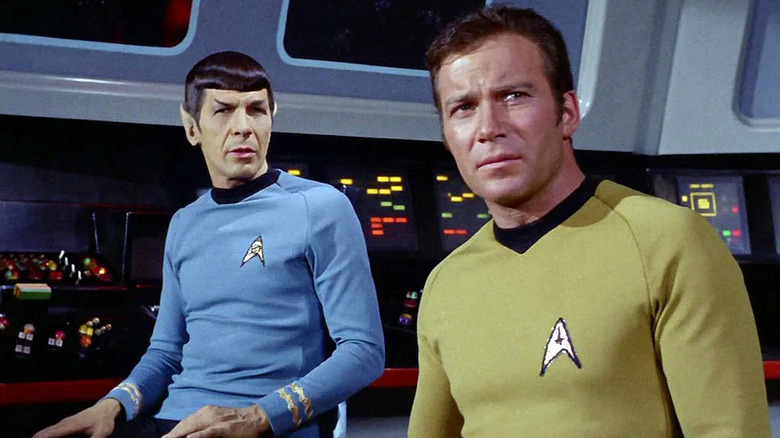
William Shatner is famously a spotlight hog, but even he doesn't understand why Captain Kirk is the role that's kept him famous. Ahead of "Star Trek: The Motion Picture," Shatner sat down for an interview with Bill Boggs and said the enduring popularity of "Star Trek" left him "totally mystified."
While "The Motion Picture" doesn't have a sterling reputation, it is a testament to the popularity of "Star Trek." A decade-old series, ignominiously canceled after three seasons, got a second shot as a blockbuster movie. Chances like that don't come without an enduring audience, and Trekkies are some of the most devoted out there. But what makes them so devoted in the first place? Boggs had his suggestions and, despite his professed mystification, so did Shatner.
Some Suggestions

When Bill Boggs first asked William Shatner about the popularity of "Trek," he described the series as, "good for kids." A tone that appeals to the whole family broadens your audience. Plus, if a story hooks fans while they're young, they're that much more likely to stick with the series for life.
Shatner said "Some people like the science fiction aspects of it." Of course, that's a rather broad answer, so Shatner noted that while some, "like the action and adventure," he also made sure to mention, "there was a philosophical overtone to many of the shows." Along the way, he dovetailed to an explanation for why the science-fiction genre appeals to people: "Science fiction by its very nature says that the future itself will exist and that sense of hope that we won't be obliterated tomorrow is a factor."
"Star Trek" premiered in 1966, when the Cold War (and nuclear annihilation with it) was on everyone's mind. Social upheaval was underway in the United States too. The future of "Star Trek" was not only stable, but progressive as well; the Enterprise's crew included black folks, an Asian man, and a Russian Jew, all depicted as competent professionals working alongside the white guys as equals. This wasn't the norm for 1960s television.
Dr. Martin Luther King Jr. was such a big fan of the tomorrow promised by "Star Trek" that he even convinced Nichelle Nichols (Lt. Uhura) not to leave the series. Rather than an early departure, Nichols would stay on the series until the end and then return for "The Motion Picture" and all its sequels.
A Hit Is A Hit

Shatner's final suggestion was that "Star Trek" fans simply liked the characters ("the family of players"). In fact, "Star Trek" was probably the birth of fandom as we know it in the internet age. During and after the series' run, fans assembled, printed, and distributed magazines filled with "Trek" tributes and fan fiction. You don't draw art of Spock or write short stories about the Enterprise crew unless you're passionate about those characters. This sort of fan activism doubtlessly helped the life-span of the series' influence and audience, paving the way for "The Motion Picture."
With the variety of answers that Shatner and Boggs offer, it's clear neither one has the explanation. However, Shatner ultimately turned his befuddlement into a keen observation:
"The only thing I come up with is the mystique of what a hit is in the first place. What makes a hit play, what makes a hit movie, we really don't know because if the makers of that hit movie, hit play could analyze it and say it's three drops of talent and four drops of writing they would make that same formula. And come out with a hit movie as frequently as they could just turn the cameras but that isn't the case."
Since art relies on experimentation, we're all better off that you can't quantify a hit. Sometimes, a little mystification isn't such a bad thing.
Read this next: The 55 Best Space Movies Ever
The post William Shatner Could Never Quite Understand Star Trek's Success appeared first on /Film.
from /Film https://ift.tt/ns1HqcR







0 Comments
Please don't use vulgar comments and avoid discussion on Religious matters